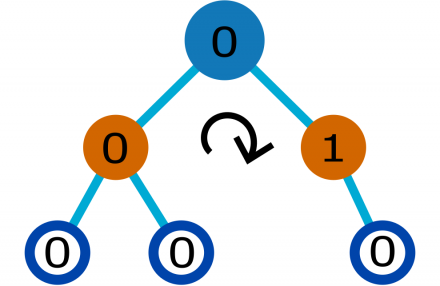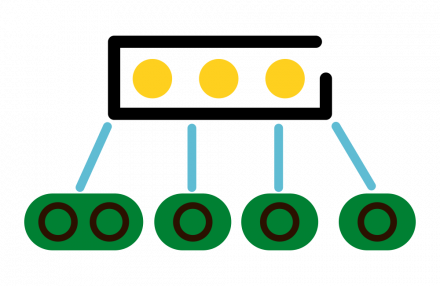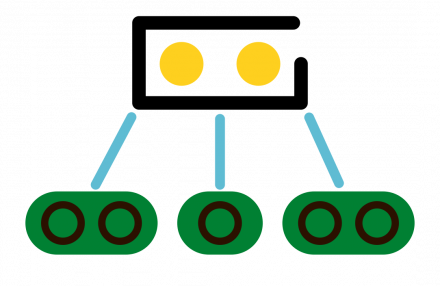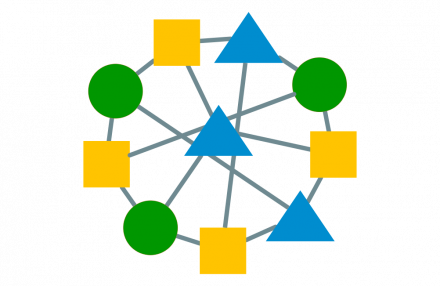This post containing some libraries, reusable functions and structs for Binary Search Tree (BST).
Binary Tree
A tree in which each node has at most two children
Balanced Binary Tree
Left subtree of T is balanced
Right subtree of T is balanced
The difference between heights of left subtree and right subtree is not more than 1.
Complete Binary Tree
A binary tree is considered to be completed if it is full until 2nd last level, and it has leave that is full from left to right.
A completed BST is balanced.
Full Binary Tree
A binary tree of height h whose leaves are all at the level h and whose nodes all have two children; this is considered to be completely balanced.
A full BST is balanced.
A full BST is complete.
Binary Search Tree
A sorted binary tree, according to the key values in the nodes. Like below.

Abstract Data Type (ADT)
// BST tree type node
template<class Type>
struct node_t
{
Type data;
node_t<Type> *left;
node_t<Type> *right;
};
Get the size of a BST
template<class Type>
int BST_size(node_t<Type> * root)
{
return ((root) ? 1 + BST_size(root->left) + BST_size(root->right) : 0);
}
Get the height of a BST
template<class Type>
int BST_height(node_t<Type> * root)
{
if (root)
{
int left = BST_height(root->left);
int right = BST_height(root->right);
if (left > right)
return ++left;
else
return ++right;
}
return 0;
}
Clear a BST
// Return number of node deleted
template<class Type>
int BST_clear(node_t<Type>* &root)
{
int count = 0;
if (root)
{
count = BST_clear(root->left) + BST_clear(root->right) + 1;
delete root;
root = NULL;
}
return count;
}
Display items by value in order for a BST
// Return number of node displayed
template<class Type>
int BST_display(node_t<Type>* root)
{
int count = 0;
if (root)
{
count += BST_display(root->left);
cout << root->data << " "; ++count; count += BST_display(root->right);
}
return count;
}
Display a Tree like graph
/*
output:
191
169 <
161
144 <
137 \
124
120 <
83 \
35
34 <
11
*/
// Declaration
template<class Type>
int BST_dis(node_t<Type> *root, int lv =1);
template<class Type>
int BST_dis(node_t<Type> *root, int lv)
{
int cc = 0;
if (root)
{
cc = BST_dis(root->right, lv + 1) + 1;
int sp = lv;
while (sp-- > 1)
{
cout << " ";
}
cout << root->data
<< ((root->left && root->right) ? " < " : ((root->right) ? " / " : ((root->left) ? " \\ " : "")))
<< endl;
cc += BST_dis(root->left, lv + 1);
}
return cc;
}
Insert into a BST by value as a leaf
// return the level of this new node in the BST
template<class Type>
int BST_insert(const Type &to_insert, node_t<Type>* &root)
{
if (root)
{
if (to_insert < root->data)
return BST_insert(to_insert, root->left) + 1;
else
return BST_insert(to_insert, root->right) + 1;
}
else
{
root = new node_t<Type>;
root->data = to_insert;
root->left = root->right = NULL;
}
return 1;
}
Remove item by value in a BST
Using a helper function to maintain the BST after removing a node.
Finding the inorder successor of the removed node and replace the node to be removed with it.
Then remove the inorder successor.
// Return whether removal is successfully
template<class Type>
bool BST_remove(const Type &to_remove, node_t<Type>* &root)
{
if (root)
{
if (to_remove == root->data)
{
if (root->left && root->right)
BST_remove_supply_smallest(root->data, root->right);
else if (!root->left && !root->right)
{
delete root;
root = NULL;
}
else
{
node_t<Type> *del = root;
root = ((root->left) ? root->left : root->right);
delete del;
}
return true;
}
else if (to_remove < root->data)
return BST_remove(to_remove, root->left);
else
return BST_remove(to_remove, root->right);
}
return false;
}
// Remove the smallest item and supply it back by parameter
// Return whether there is a node removed
template<class Type>
int BST_remove_supply_smallest(Type &receive, node_t<Type>* &root)
{
if (root)
{
if (root->left)
return BST_remove_supply_smallest(receive, root->left);
else
{
node_t<Type>* del = root;
receive = root->data;
root = root->right;
delete del;
return 1;
}
}
return 0;
}
Make a complete copy of BST
// dest is the destination BST
// source is the source BST to be copied
template<class Type>
int BST_copy(node_t<Type>* &dest, node_t<Type>* source)
{
int count = 0;
if (source)
{
dest = new node_t<Type>;
dest->data = source->data;
count = BST_copy(dest->left, source->left) + BST_copy(dest->right, source->right) + 1;
}
else
dest = NULL;
return count;
}
Determine if a BST is height-balanced tree
// Returns true is balanced
template<class Type>
bool BST_is_balanced(node_t<Type> *root)
{
int lh; /* for height of left subtree */
int rh; /* for height of right subtree */
/* If tree is empty then return true */
if (root == NULL)
return 1;
/* Get the height of left and right sub trees */
lh = BST_height(root->left);
rh = BST_height(root->right);
int differ = lh - rh;
// The difference of heights of left subtree and right subtree is not more than 1.
if ((differ == 1 || differ == 0 || differ == -1) &&
BST_is_balanced(root->left) &&
BST_is_balanced(root->right))
return 1;
/* The tree is not height-balanced here */
return 0;
}
Determine if a BST is a completed BST
// Return true is completed
template<class Type>
bool BST_is_complete(node_t<Type>* root)
{
if (root)
{
int largest_index = 0;
int cc = BST_is_complete(root, largest_index, 0);
return (((largest_index) < cc) ? 1 : 0);
}
return 0;
}
/*
Recursive helper function to determine if a BST is a completed BST
*/
template<class Type>
int BST_is_complete(node_t<Type>* root, int &index, int local_index)
{
if (root)
{
if(local_index > index)
index = local_index;
// Recur for left and right subtrees
return (BST_is_complete(root->left, index, 2 * local_index + 1) +
BST_is_complete(root->right, index, 2 * local_index + 2)) + 1;
}
return 0;
}
Determine if a BST is a full BST
template<class Type>
bool BST_is_full(node_t<Type>* root)
{
if (root)
{
if (root->left && root->right)
return ((BST_is_full(root->left)) ? (BST_is_full(root->right) ? 1 : 0) : 0);
else if (!root->left && !root->right)
return 1;
else
return 0;
}
return 0;
}
Count duplicated elements
For elements 1 2 3 4 4 5 5 5 6 6, number of duplicated elements is 4.
// Declaration
template<class Type>
int count_d(node_t<Type> *root, node_t<Type> *last = 0);
template<class Type>
int count_d(node_t<Type> *root, node_t<Type> *last)
{
int count = 0;
if (root)
{
count = count_d(root->left, last);
if (last && last->data == root->data)
++count;
else
last = root;
count += count_d(root->right, last);
}
return count;
}
Remove the largest element
1 4 5 8 9 15 19, remove 19
template<class Type>
int remove_largest(node_t<Type> *&root)
{
int la = 0;
if (root)
{
if (root->right)
{
la = remove_largest(root->right);
if (root->data == la)
{
node_t<Type> *temp = root->left;
delete root;
root = temp;
}
}
else
{
la = root->data;
node_t<Type> *temp = root->left;
delete root;
root = temp;
}
}
return la;
}
Remove the 2nd largest element
1 4 5 8 9 15 19, remove 15
template<class Type>
int remove_2nd_largest(node_t<Type> *&root)
{
int la = 0, se = 0;
return remove_2nd_largest(root, la, se);
}
// recursive helper fnc for removing the 2nd largest element
template<class Type>
int remove_2nd_largest(node_t<Type> *&root, int &largest, int& second)
{
int cc = 0;
if (root)
{
cc = remove_2nd_largest(root->right, largest,second);
if (!largest)
{
largest = root->data;
}
else if ((!second && largest > root->data) || (second && second == root->data))
{
second = root->data;
if (root->right) // right is largest
{
node_t<Type> *del = root;
if(root->left)
root->right->left = root->left;
root = root->right;
delete del;
}
else
{
node_t<Type> *del = root;
root = root->left;
delete del;
}
++cc;
}
if( !second || (second && root && root->left && root->left->data == second))
cc += remove_2nd_largest(root->left,largest,second);
}
return cc;
}
Remove the largest 2 elements
1 4 5 8 9 15 19, remove 15 and 19
// Return # of elements removed
template<class Type>
int remove_largest2(node_t<Type> *& root)
{
int *cc = new int(0);
remove_largest2(root, cc);
return *cc;
}
// recursive helper fnc for removing the largest 2 elements
template<class Type>
int remove_largest2(node_t<Type> *&root, int *cc)
{
int c = 0;
if (root)
{
c = remove_largest2(root->right, cc);
if (!root->right && *cc <2) {
node_t<Type>* temp = root->left;
delete root;
root = temp;
++(*cc);
if (root)
return remove_largest2(root, cc);
}
if (*cc <2 && root) return remove_largest2(root->left, cc);
}
return c;
}
Copy even elements of a BST to a new BST
// Return # of elements copied
template<class Type>
int copy_even(node_t<Type> *&root1, node_t<Type> *root2)
{
if (root2)
{
if (root2->data % 2 == 0)
{
if (root1)
{
BST_insert(root2->data,root1 );
return copy_even(root1, root2->left) + copy_even(root1, root2->right) + 1;
}
else
{
BST_insert(root2->data,root1);
return copy_even(root1->left, root2->left) + copy_even(root1->right, root2->right) + 1;
}
}
else
return copy_even(root1, root2->left) + copy_even(root1, root2->right);
}
return 0;
}
Copy all leave of a BST to a new BST
// Declaration
template<class Type>
int copy_leaf(node_t<Type> *&root1, node_t<Type> *root2, int swap = 0);
// Return # of elements copied
template<class Type>
int copy_leaf(node_t<Type> *&root1, node_t<Type> *root2, int swap)
{
if (root2)
{
if (!root2->left && !root2->right)
{
if (root1)
{
BST_insert(root2->data, root1);
return copy_leaf(root1, root2->left) + copy_leaf(root1, root2->right) + 1;
}
else
{
BST_insert(root2->data, root1);
return copy_leaf(root1->left, root2->left) + copy_leaf(root1->right, root2->right) + 1;
}
}
else
{
if(swap)
return copy_leaf(root1, root2->left, 0) + copy_leaf(root1, root2->right, 0);
else
return copy_leaf(root1, root2->right,1) + copy_leaf(root1, root2->left,1);
}
}
return 0;
}
Remove all even elements of a BST
template<class Type>
int BST_remove_even(node_t<Type> *&root)
{
int cc = 0;
if (root)
{
cc += BST_remove_even(root->left);
cc += BST_remove_even(root->right);
if ((root->data % 2) == 0)
{
if (root->left && root->right)
BST_remove_supply_smallest(root->data, root->right);
else if (!root->left && !root->right)
{
delete root;
root = NULL;
}
else
{
node_t<Type> *del = root;
root = ((root->left) ? root->left : root->right);
delete del;
}
++cc;
}
}
return cc;
}
Search a BST for a range of elements
// This function display element in a range
// return # of elements in a range
template<class Type>
int BST_search(node_t<Type> *root, int max, int min)
{
bool f = 0, p =0;
return BST_search(root, max, min, f, p);
}
// recursive helper fnc for searching elements in a range
template<class Type>
int BST_search(node_t<Type> *root, int max, int min, bool &found, bool &pass)
{
int cc = 0;
if (root)
{
if (min < root->data)
cc = BST_search(root->left, max, min, found, pass);
if (!pass && min <= root->data && root->data <= max)
{
++cc;
found = 1;
cout << root->data << " ";
cc += BST_search(root->right, max, min, found, pass);
}
else if (found)
{
pass = 1;
}
else if(max >= root->data)
cc += BST_search(root->right, max, min, found, pass);
}
return cc;
}
Reverse an in-order BST to reversed order
// 1 2 3 => 3 2 1
// return # of element
template<class Type>
int BST_reverse(node_t<Type> *root)
{
int cc = 0;
if (root)
{
cc = BST_reverse(root->left) + BST_reverse(root->right) + 1;
node_t<Type> *temp = root->right;
root->right = root->left;
root->left = temp;
}
return cc;
}
Duplicate all elements except root node
// Return # of elements duplicated
template<class Type>
int BST_duplicate_all(node_t<Type> *root, node_t<Type> *ro)
{
int cc = 0;
if (root)
{
cc = BST_duplicate_all(root->left, ro) + BST_duplicate_all(root->right, ro) + 1;
if (root != ro)
add_to_left(root->right, root->data);
}
return cc;
}
// Recursive helper function for duplicating all elements except root node
template<class Type>
int add_to_left(node_t<Type> *&root, int data)
{
if (root)
return add_to_left(root->left, data);
else
{
root = new node_t<Type>;
root->data = data;
root->right = root->left = 0;
}
return 1;
}







